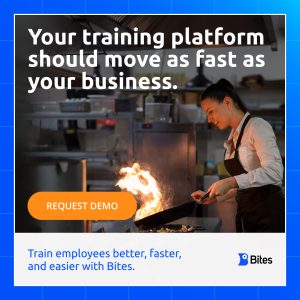A learning management system – or LMS – is a platform meant to manage and deliver employee training and certifications. While an LMS has traditionally been the training tool of choice for the restaurant industry, there are now additional approaches that act as supplements to an existing LMS and can enhance employee engagement, preparedness, and service. Microlearning is an excellent example of this.
We’ll dive more into the intricacies of microlearning later on in this article, but essentially this approach involves breaking up staff training into small, bite-sized sections that build upon the content in an LMS. Research proves employees prefer this training strategy – 58% of them say they’re more likely to use an LMS that incorporates microlearning, with 38% stating they’re much more likely to do so. Let’s explore further the advantages of microlearning, starting with how it addresses the major challenges of a traditional LMS.
How does microlearning solve the common challenges of restaurant training?
There’s a reason that the size of the microlearning market reached $1.86 billion in 2021 – businesses are finding real value in this approach for training their staff. That’s because it addresses the common challenges they’re facing with just an LMS.
Challenge #1: Low employee engagement
An LMS delivers training courses usually in sequential order and as long-form content with limited multimedia. Employees need to move through each module in the set progression, even if it’s not relevant to their tasks at the time. Often, this leads to low completion rates and reduces engagement. Even offering LMS courses online isn’t enough – the average completion rate of online staff training courses is just 5-15%.
Microlearning can train employees on the same topics as an LMS, but in a far more digestible and relevant way. Instead of long blocks of content, restricted types of media, and fixed progression, each piece of microlearning content is often 10 minutes, at maximum, offers flexibility, and can look like anything from an employee training video to an interactive quizlet. This encourages staff to interact with training – not just sit and click through it, like with an LMS – to actually retain the information better (50% better, according to some studies).
Challenge #2: Limited accessibility
Using an LMS often allows business owners and training managers to put their content online. But, it is often lacking from a user experience standpoint and is difficult for employees to access and navigate. Plus, it’s usually not mobile-friendly.
Microlearning can enhance your LMS by acting as a mobile learning platform. It takes a mobile-first approach to staff training, which 48% of employees agree would encourage them to engage more with the materials. This makes it easier for employees to refresh their memory and explore a relevant topic at a time that’s suitable for their schedules – all without any technical effort.
Taking training on the go with the device staffers use most is also a big value-add for Gen Z employees. In the face of labor shortages and the fact that 75% of the restaurant workforce is Gen Z or millennials, appealing to this audience is key. Consider that 95% of Gen Z owns a smartphone, and they spend an average of 4 hours and 15 minutes each day using it. Having restaurant training materials available as a mobile learning platform means enhancing accessibility and reaching and retaining Gen Z employees more effectively.
Challenge #3: Finite scalability
An LMS is good for providing the core training materials that are perennial to an F&B business, like guidelines that often take more time to complete. The platform creates a systemized and consistent training environment – but with limited flexibility and a lack of specific scenario training. And, once an owner or manager picks an LMS, they’re stuck with the content it already has. To increase the number of users or add content would require a heavy load on budget – and likely resources.
Microlearning is a flexible approach that can include on-the-job learning opportunities and allows businesses to make updates as the organization scales – and training materials need to change with it. For example, a restaurant owner can create a 3-minute employee training video about a niche subject, like how to carry 8 wine glasses. It’s easy to create the microlearning content, distribute it, and provide real-time value to employees as the business scales.
Why is Bites an ideal complement to an F&B LMS?
Bites is a leading mobile learning platform for restaurant training that’s built to help create, manage, and share microlearning content with F&B staff. It lets businesses take advantage of all the microlearning benefits mentioned above in one affordable, easy-to-use platform. Bites integrates directly with the most widely used messaging apps, so it’s easier than ever for restaurant employees to access their training materials – even on the go.
Improve a training strategy by introducing Bites to replace an existing LMS or as an addition to one. With the video-based approach that easily translates training materials into engaging microlearning content, businesses can:
- Boost completion rates
- Enhance employee engagement
- Help owners and managers retain staff more effectively
Train, engage, and retain staff more effectively – start creating microlearning content today. To see the advantages in action, try a demo of Bites.





